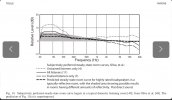- Joined
- Apr 7, 2024
- Messages
- 214
- Likes
- 676
I don’t see any way for this debate to settle without an independent party conducting a large scale test with jointly agreed methods and hypothesis . Everything is a conjecture currently.
No, we don 't need to re-invent the wheel, and "everything is conjecture currently" is false.
It's not conjecture when a doctor who knows more than you do points out a tumor on an x-ray.
It's not conjecture when you say that you're going to shoot yourself in the foot with a 12 ga. shotgun and I say, "That's gonna hurt!"
It's not conjecture to say that you'd die of asphyxiation in outer space, even though you have never visited there.
It's not conjecture to say that magnesium oxidizes under water.
Some things are already known. Some things are not. Don't waste your time (and ours) by not acknowledging what is already known. Instead, investigate what is not known.
And don't shoot yourself in the foot.
Jim
Last edited:




 ) to indicate as such, but many times posters here forget to do that.
) to indicate as such, but many times posters here forget to do that.